Saudi-led Arab countries
Peacebuilding through Islamism of Tolerance and Cooperation
By Ikuzo Kobayashi, President, Salaam Association
From the Spring Issue of the electronic “Salaam Quarterly Bulletin”, No.45, May 2023
This year on March 10, 2023, an agreement between Saudi Arabia and Iran to restore diplomatic relations was announced. Isn’t the change in Saudi Arabia, which seems to have been expanding its encirclement of Iran in the confrontation between Saudi Arabia and Iran, the result of the strained relationship between Saudi Arabia and the United States? Moreover, some people suspect that the fact that China mediated the agreement is evidence of this. Is this really the case? Is this really the case?
In this article, I would like to analyze the situation from the perspective of reform and construction promoted by King Salman and Crown Prince Muhammad of Saudi Arabia.
1. King Salman is responsible for the administration of the Holy City.
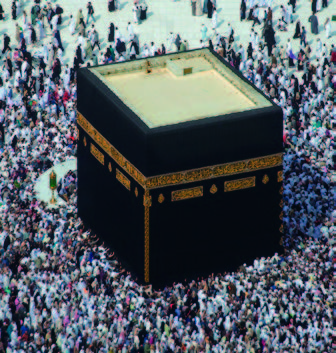
al-Kaʿba: The temple is considered the highest holy place in Islam (from Wikipedia).
Saudi Arabia is accepted by all Muslims as a country that protects the Holy City and welcomes pilgrims, as the home to the two major holy cities of Islam, Makkah (Mecca) and Madinah (Medina). The king’s responsibility as “the guardian of the two holy cities” is his primary responsibility. The Hajj (Grand Pilgrimage), one of the five obligatory practices of Islam (the Five Pillars), is performed every year in December of the Islamic calendar, and in recent years the number of pilgrims has exceeded 2 million, sometimes 3 million.
However, in September 2015, an incident of crushing death of participants occurred, resulting in over 2,000 deaths. Apart from involvement in this tragic incident, 47 people, including al-Qa’ida members, who were involved in the terrorist attack were executed. Among them was Shiite leader Sheikh Nimr, who led anti-government protests against Saudi Arabia in 2011-12. Iran considers Nimr a high-ranking Shiite cleric, and Iran’s Supreme Leader Khamenei strongly condemned the Saudis. The following year, on January 2, 2016, a mob of Iranians invaded and threw Molotov cocktails into the Saudi embassy in Tehran. Saudi Arabia immediately severed diplomatic relations with Iran in response to this outrage.
Iran, on the other hand, decided not to participate in the Hajj that year, claiming that the actual number of Iranians included in the previous year’s Hajj deaths was higher than the number announced by the Saudis and that the Saudi announcement failed to clarify the detailed cause of the accident which was requested by Iran.
In addition, due to the 2020 COVID-19 pandemic disaster, the Hajj was unusually scaled back, banning the acceptance of pilgrims from outside the country and allowing only 10,000 Saudi residents.
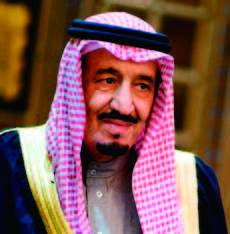
Salmān bin ʻAbd al-ʻAzīz Āl Saʻūd was born on December 31, 1935 in Riyadh, Saudi Arabia. (From Wikipedia.)
As the new king, however, the succession issue and the challenge of restoring honor after the incident at the Hajj, as well as the challenge of accepting the pilgrimage, which arose from the conflict with Iran, became a continuing challenge.
2. Deputy Crown Prince Mohammad who promotes Saudi Arabia’s reform
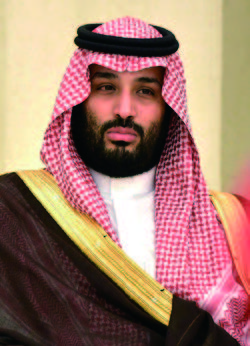
Mohammad bin Salman Al Saud was born on August 31, 1985 in Riyadh, Saudi Arabia. (From Wikipedia)
In 2015, when the new King Salman took the throne, ISIS (Islamic State) was on the rampage, and countermeasures against ISIS (Daesh) and terrorism were pressing issues. In addition, Saudi Arabia was under global pressure to reduce oil production, with Russia, Venezuela, and Iran demanding oil production cuts to restore oil prices and the U.S. demanding prices that would make it profitable for shale oil mining companies.
In the January 27 meeting between King Salman and U.S. President Barack Obama, the King emphasized his stance not to allow Iran’s possession of nuclear weapons but avoided criticism of the Iran nuclear deal in an effort to build trust. Deputy Crown Prince Muhammad took over the position of Defense Minister, which had been the duty of his father, the new King, and became chairman of the Economic Development Council and was further entrusted with the responsibility of King’s Special Advisor.
Deputy Crown Prince Muhammad promoted the February 2015 resolution by the GCC (Gulf Cooperation Council), which consists of six Gulf Arab states, to cut off funding for terrorists, strengthen surveillance of areas under its control, and increase monitoring of Daesh (ISIS, Islamic State). On December 15, he formed the Islamic Military Alliance.
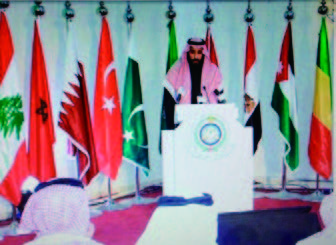
On December 15, 2015, Saudi Arabia announced the formation of an anti-terrorism “Islamic Military Alliance” consisting of 34 countries and regions in the Middle East, Africa, and Asia.The military alliance will be led by Saudi Arabia and have its operational headquarters in the Saudi capital Riyadh. It is also looking to collaborate with the West, and was “born out of a zeal to fight terrorism that strikes the Islamic world and the international community,” said Deputy Crown Prince Mohammad (Defense Minister). (Jiji Press Cairo)
On September 1, 2016, during his visit to Japan, the Deputy Crown Prince announced that he would make major changes to Saudi Arabia’s economy and society by formulating “Vision 2030,” and Japan responded that it would support and cooperate in its realization. “Vision 2030” had been spearheaded by the Deputy Crown Prince since April of that year, and the budget deficit caused by low crude oil prices was announced as a plan of listing less than 5% of Saudi Aramco’s share.
Masayuki Yamauchi, specially-appointed professor at Meiji University, contributed an opinion article to the Sankei Seiron (dated July 29, 2016) in which he expressed his hope that “Saudi Arabia’s transformation will determine the course of the Middle East.” However, he also pointed out that “the Deputy Crown Prince’s vision of establishing a $2 trillion national fund to boost its financial competitiveness, and his statement that he would “create a national fund with 10% of the world’s investment power by selling less than 5% of Aramco’s shares” took the world by surprise, but expressed his concern that it will be difficult to persuade Wahhabi religious leaders.
3. Deputy Crown Prince Muhammad is promoted to Crown Prince (first in line of succession to the throne)
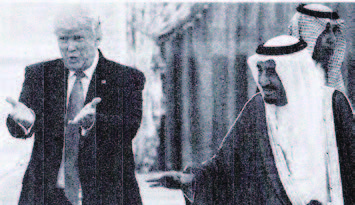
President Trump and King Salman of Saudi Arabia in Riyadh on May 20 (AFP=Jiji Press) (from Sekainippo, May 22, 2017)
On June 21, 2017, King Salman announced via state news agency that his son Muhammad bin Salman, 31, Deputy Crown Prince and Minister of Defense, would be promoted to Crown Prince, the first in line of succession to the throne. Crown Prince Muhammad bin Nayef was relieved of all duties. The position of Prime Minister was also assumed by King Salman, while Crown Prince Muhammad was appointed Deputy Prime Minister. Thirty one of the 34 members of the “Loyalty Committee,” which discusses the succession to the throne, supported the decision.
One month earlier, on May 21, U.S. President Trump chose to visit the Middle East on his first overseas trip, delivering a speech in Riyadh, the capital of Saudi Arabia. Trump boldly reversed former President Barack Obama’s Middle East policy by stating, “Our goal is to form a coalition of nations that share the purpose of eradicating extremism and bringing a hopeful future for our children.” Former House Speaker Newt Gingrich, in an op-ed for the Washington Post, described the speech as “historic,” saying that “never before has a U.S. president made so clear the unity of the civilized world, including the Middle East and Africa, in the fight against terrorism.”
President Trump’s speech was a powerful cheerleading speech for Saudi Arabia, which has led the Islamic Military Alliance, and for Crown Prince Mohammad, who has been pushing for military intervention to counter the Houthis in Yemen, who are backed by Iran. Not only that, but the achievement of the Saudi-led alliance of some 50 countries, regions, and organizations was a great success for the Saudis.
That year, Mosul, the alleged capital of ISIS namely “Islamic State” in Iraq, fell in June, and Raqqa, the alleged capital of Syria, in October. The Islamic State collapsed.
4. Tolerance and Cooperation in Islam
In February 2015, the GCC resolved to “cut off funding for terrorism, strengthen surveillance of areas under its control, and intensify monitoring of Daesh (Islamic State of ISIL),” stressing that peace would be restored through “Islamic tolerance and cooperation.”
The Gulf states, with Saudi Arabia as the leader of their alliance, united under the slogan of “Islamic tolerance and cooperation,” broke away from Islamic extremism, and clearly stated their opposition to Daesh. This seems to have been a departure from the violence mixed in with Islamism.
The Wahhabism of Saudi Arabia which is the national religion is derived from Salafism. While it is reactionism in terms of its opposition to Western secularism, it is positive toward commerce and the economy, and strongly oriented toward a market economy. The Muslim Brotherhood, also derived from Salafism, is strongly oriented toward social welfare and measures to address the disparity between rich and poor. Both these two reform movements, which have their origins in Salafism, have been divided into moderate and radical reforms, depending on whether they tolerate inner freedom in the religious life and social practice or enforce it with intolerance.
Fifteen of the 17 perpetrators of the simultaneous terrorist attacks in the U.S. on September 11, 2001 were Saudis. They were Wahhabists of the extreme variety. The Egyptian Islamic Jihad, which was derived from the Muslim Brotherhood, assassinated President Sadat of Egypt. Later, Al-Qaeda was formed, mainly including the Islamic Jihad, and by extension, Daesh, which aimed to create an Islamic empire with territorial domination. The mistake of the extremists was to fall into violence with self-righteousness and exclusivism, not knowing that true reform aiming at an ideal starts from the true freedom of the human heart given by God.
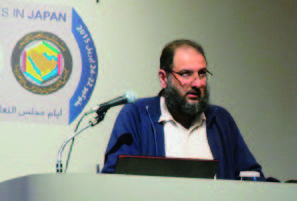
Dr. Al Qatan, Director General of the Religious Affairs Bureau of the Ministry of Justice in Bahrain
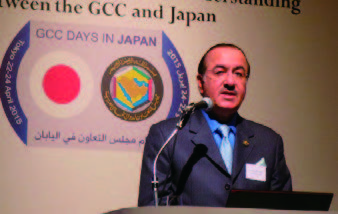
H.E. Bilal, Ambassador of Qatar to Japan
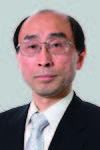
Counselor, Ministry of Foreign Affairs, Ambassador to GCC Shigeru Endo
The GCC meeting was held in Tokyo for three days in April, 2015.
On the second day of the conference, Dr. Al Qatan, Director General of the Religious Affairs Bureau of the Ministry of Justice in Bahrain, said, “Each sect, ideology, and idea will be treated equally. Mutual respect and deference will be shown to each other. The starting point is respect for humanity, transcending racial and ethnic differences, as stated in the UNESCO Charter.” He added that “Islamic tolerance” has become well known at the United Nations in New York, and at the Vienna Conference in 2012, it was agreed that “tolerance eliminates extremism.” He also reported that in February 2015, a resolution was adopted to “ban terrorism” in Mecca, and that the GCC has been actively working against Daesh.
In the final session, H.E. Bilal, Qatar’s Ambassador to Japan, cited “tolerance and compassion” as shared values between the GCC and Japan. In response, Ambassador Endo to GCC responded that mutual understanding between the GCC and Japan has been greatly enhanced by the spirit of “harmony” and “tolerance”.
5. Reform of Islamic societies
Leaving aside the debate over whether or not Islam needs the religious reforms that Christianity has experienced, it is only natural that human societies seek change with the times in order to achieve happiness. From this perspective, it is also natural that reform is required in Islamic society and the Islamic nation. There is no need to reject it excessively by assuming that it is an imposition of Western culture or Christian democracy. All we need to do is humbly learn what we need to learn and accept what we need to accept. In this sense, the economic and social reforms being promoted by Crown Prince Muhammad will be an urgent task needed to form an “Islamic Military Alliance” in cooperation with the West against the ultra-radical and militant Daesh, to protect moderate Muslims based on non-violence, and to protect moderate Gulf emirates such as Saudi Arabia.
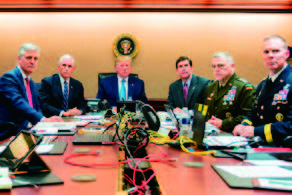
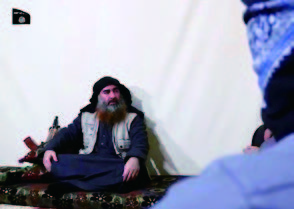
U.S. President Trump (center) and Vice President Pence (second from left) watch the Baghdadi raid operation in the command center. On October 30, 2019, U.S. forces dispatched by the U.S. Department of Defense raided a facility where the suspect Abu Bakr Baghdadi, the supreme leader of the Islamic State (IS) militant group, was hiding.
6. Economic Reforms
On the other hand, the Gulf countries, which share an economic structure dependent on crude oil (natural gas), have all made efforts to break away from their economic dependence on oil in anticipation of the finite nature of their natural resources. The oil strategy led by nationalist pan-Arabism came to an end with the global recession that followed the second oil shock in 1979 and the emergence of non-OPEC countries, and an era of oil prices based on supply and demand balance has dawned. In addition, the issue of global warming was raised, and a shift away from fossil fuels that emit large amounts of carbon dioxide gas became a global challenge.
In the midst of these present-age demands, Saudi Arabia, the world’s largest oil producer (10 million barrels produced per day), was urged to remain an energy supplier that would help stabilize crude oil export prices and to break away from its dependence on oil (70% of its revenue is related to oil). It is no wonder that King Salman appointed the young Crown Prince Mohammad not only Minister of Defense but also Chairman of the Economic Development Council, giving him full responsibility for economic reform.
Saudi Aramco’s successful listing

From ARAB NEWS HP
On December 11, 2019, Saudi Aramco, the Saudi Arabian domestic oil company, listed its shares in Saudi Arabia. The 1.5% of shares outstanding on the listing generated 96 billion riyals (2.7 trillion yen), the largest amount in history, surpassing the largest Chinese e-commerce company Alibaba, which was listed in New York. Aramco’s market capitalization at the time of its listing was $1.8779 trillion (approximately 200 trillion yen), making it the world’s largest listed company, surpassing U.S. Apple Inc. Aramco’s listing was the centerpiece of national reforms, and the funds obtained made it possible to strongly promote “Vision 2030”.
7. International cooperation
Saudi Arabia, as the central state of an Islamic population of 1.5 billion world-wide, is the leading power of the Islamic world and has been an advocate of the third world, refusing to be part of the two major camps of East and West. This is because of its different religious culture. While Saudi Arabia respects Judeo-Christians as a people of scripture, it considers materialism and atheistic communism to be the target of jihad.
For example, in response to the Soviet military invasion of Afghanistan in 1979, there was a heightened awareness among Muslims that they should stand up as a jihadist force. Thus, the call for “jihad” against the Soviet forces attracted many volunteer soldiers from around the world.
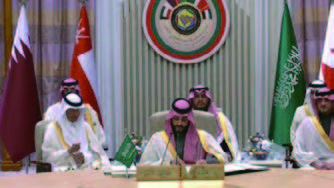
Opening remarks at the 43rd Gulf Cooperation Council (GCC) Summit by Saudi Arabia’s Crown Prince Mohammad bin Salman in September 2022. (Screengrab)
If this basic stance is maintained in relations with Iran, there is no need to continue the proxy war in Yemen with Iran. This is his mindset. The Islamic Military Alliance also focused on countering Daesh and combating terrorism, and not on taking a hostile stance against the Shiites or Iran. If Iran supports the political settlement in Yemen by the UN envoy, the break in diplomatic relations with Iran since 2016 will be resolved.
In the midst of such behind-the-scenes activities, Saudi Arabia and Iran resumed diplomatic relations on March 10, 2023. The world has been speculating in various ways about the agreement because the country that brokered it was China. However, this is not a major event. The groundwork for the resumption of diplomatic relations had already been laid.
So why is China acting as an intermediary? Because it is impossible to ask the U.S., which has not yet restored diplomatic relations with Iran, to mediate the resumption of diplomatic relations with Iran. If Prime Minister Abe were still alive, there is a possibility that the Saudis would have asked Japan to mediate. However, after Abe’s death, there was no one in Japan who could be relied upon. Therefore, it is believed that China’s mediation was accepted. This was such a lucky opportunity for China’s Xi Jinping. The strategic partnership between Saudi Arabia and China is focused only on the economic aspect, and it is not likely to progress to a deeper commitment on the religious and military fronts.
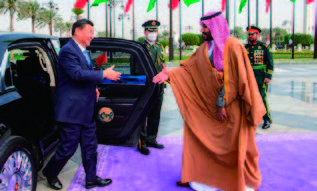
Photo shows Crown Prince Muhammad welcoming Chinese President Xi Jinping on December 8, 2022. From NIPPON.COM January 25, 2023 website.
